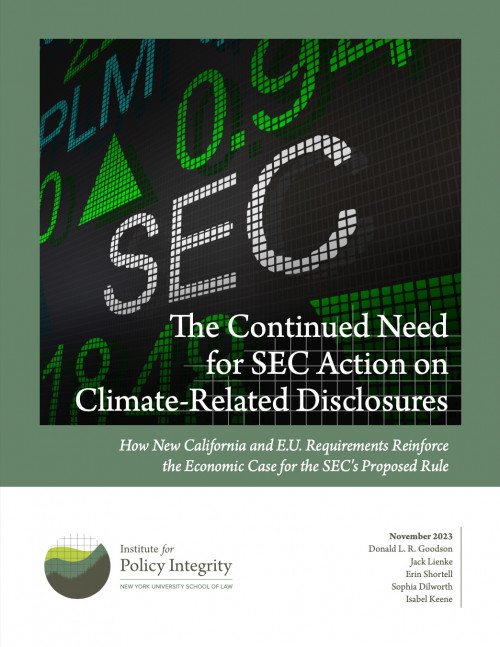-
Policy Integrity Suggestions Reflected in DOT’s Final Rule Requiring Automatic Refunds of Airline Tickets
On April 24, 2024, DOT issued a final rule on airline ticket refunds which, among other things, will require airlines to offer refunds when a passenger’s itinerary is significantly changed or delayed, and will require that passengers be given a ticket voucher if a serious communicative disease prevents them from flying. We submitted comments to DOT in November 2022 explaining that, in our view, DOT’s benefit-cost analysis was underestimating the benefits of these policies. DOT’s finalized analysis discusses our comments extensively, and implements many of our suggestions.
-
Comments to CFPB on Regulation of Overdraft Lending by Very Large Financial Institutions
In February, the Consumer Financial Protection Bureau proposed a rule that would regulate overdraft lending by very large financial institutions. Overdraft fees amount to billions of dollars a year, and those costs are disproportionately borne by low-income households. The Proposed Rule would narrow regulatory exemptions that previously enabled banks extending overdraft credit to avoid complying with the regulatory requirements otherwise imposed on credit products. The Proposed Rule reflects a well-reasoned approach to correct market failures in the overdraft credit market, mitigating harms to consumers. We submitted comments suggesting how CFPB should improve its analysis.
-
Policy Integrity Recommendations Reflected in Amendments to EPA’s RMP Rule
In February 2024, EPA finalized amendments to its Risk Management Program (RMP), under Section 112(r) of the Clean Air Act, to better protect vulnerable communities from chemical disasters that release toxic air pollution. In line with Policy Integrity’s recommendations, the final rule has been strengthened relative to the proposal and includes considerably more attention to the issues of underreporting, unquantified benefits, and the risks of catastrophic incidents. EPA has further improved the final rule to include consideration of climate change-related hazards in line with Policy Integrity’s recommendation to cover climate change-exacerbated hazards in addition to climate change-caused hazards. This will be increasingly important as the risks and magnitude of future chemical incident damages will likely only grow as climate change exacerbates severe weather that can spur power outages and chemical disasters.
-
Comments to CFTC on Voluntary Carbon Credit Derivatives Guidance
In December 2023, the Commodity Futures Trading Commission (CFTC) proposed guidance that identifies key features of high-integrity voluntary carbon credits (VCCs) for exchanges that list certain VCC derivatives. The Institute for Policy Integrity submitted comments that highlight additional sources of CFTC legal authority over these derivatives and suggest improvements to the proposed guidance’s discussions of additionality, leakage risk, quantification, risk of reversal, and exchanges’ discretion to set stringent standards. Finally, our comments recommend that the CFTC explore whether it has other authority to address issues with VCC integrity and whether to seek additional authority from Congress.
-
Comments to FTC on Proposed Rule on Unfair or Deceptive Fees
In 2021, Policy Integrity submitted a petition for rulemaking to the Federal Trade Commission (FTC) calling for a ban on the use of drip pricing. After granting the petition, the FTC in 2023 proposed a Trade Regulation Rule on Unfair or Deceptive Fees (Proposed Rule). The Institute for Policy Integrity submitted comments with suggested edits and additions to the regulatory text to ensure that the Proposed Rule fully codifies FTC's stated objectives. Our comments also suggest several actions to strengthen FTC's breakeven and cost-benefit analyses.
-
Comments to FAA on Proposed Rule to Limit Orbital Debris
In September 2023, the Federal Aviation Administration (FAA) proposed a regulation that would require commercial space operators to limit or dispose of their launches’ orbital debris within 25 years. While the Proposed Rule and its accompanying regulatory impact analysis reasonably explain why orbital debris is a problem and why regulation will help address it, we explain in our comment letter that FAA should take further steps to bolster its analysis.
-
Comments to EPA on Proposed Regulation of Trichloroethylene (TCE)
In October, EPA issued proposed restrictions on the manufacture, processing, and distribution of a chemical called trichloroethylene (TCE). We argue in comments that aspects of the agency’s Economic Analysis of the proposed restrictions could be clarified or expanded upon to better inform policymakers and the broader public about the benefits of ending TCE use.
-

The Continued Need for SEC Action on Climate-Related Disclosures
How New California and E.U. Requirements Reinforce the Economic Case for the SEC’s Proposed Rule
On March 21, 2022, the Securities and Exchange Commission (SEC) proposed a rule that would require SEC registrants (both domestic and foreign) to provide climate-related disclosures in certain SEC filings. Since the release of the SEC Proposal in March 2022, other jurisdictions, including California and the European Union, have adopted climate-related disclosure regimes. Like many federal rules, the SEC Proposal included an assessment of its costs and benefits. This report examines how the California and E.U. disclosure regimes may affect the baseline for that cost-benefit analysis and, consequently, the SEC’s assessment of the incremental costs and benefits of its proposal. Overall, we find that the new disclosure regimes do not undermine the economic case for the SEC Proposal; if anything, they bolster it.
-
Comments to PHMSA on Proposed Pipeline Safety Initiatives
In September 2023, the Pipeline and Hazardous Materials Safety Administration (PHMSA) proposed a regulation to improve the safety of certain gas pipelines. The standards include a suite of reforms to help prevent incidents like the catastrophic 2018 gas pipeline explosions in Merrimack Valley, Massachusetts. In a comment letter, we explain that, while the Proposed Rule and its accompanying regulatory impact analysis are well grounded in applicable statutes and guidance, PHMSA should take further steps to bolster its analysis.
-
Policy Integrity Work Shapes FTC Ban on Hidden Fees
In October 2023, the Federal Trade Commission (FTC) released a proposed rule that bans the use of “junk fees” in transactions including hotel reservations, vehicle rentals, and event ticket purchases. The proposed rule references Policy Integrity and our work more than a dozen times, including both our 2021 petition for rulemaking and our 2023 comment letter supporting the FTC’s authority to issue this regulation.
Viewing recent projects in Consumer and Healthcare Protection









